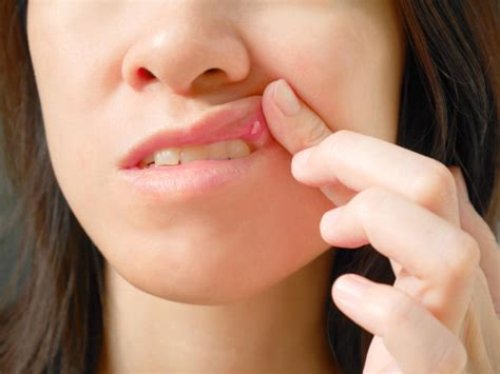
Credit: iStock.com/p_saranya
Have you ever been enjoying a tasty, crunchy, or salty treat when you felt a stinging pain in your mouth and discovered a canker sore? You might be asking yourself, are canker sores contagious? And if this isn’t your first canker sore, you have likely wondered why they reoccur.
Did you know that women are more likely to have canker sores than men? We will learn the reasons why and more in this article. Because these tiny sores are often confused with cold sores, we will also discover the differences in a canker sore vs. cold sore segment.
What Are Canker Sores?
A canker sore is a tiny, thin abrasion normally seen along the gum line and on the inner surface of the lips. Medically referred to as aphthous ulcers, these open sores can be painful, especially when acidic foods and beverages come into contact with them. As the most common mouth sore, a canker sore usually dissipates on its own within two weeks. Canker sores are often seen in young people during stressful times, during menstruation in women, and among families.
There are internal and external triggers thought to be what causes canker sores. Common factors include allergies, stress, hormone imbalances, health conditions, nutrient deficiency, low-functioning immune system, and sensitivity to food additives. Some cases may be caused by trauma to the inside of the mouth with dental work or by forcefully brushing the gum line. Let’s now look at the question, can canker sores spread in your mouth?
Are Canker Sores Contagious?
The common worry, “Is canker sore contagious?” can be settled with one word: no. This small, white or yellow lesion cannot be spread by using the same drinking cup or utensil as an affected person. Canker sores are not contagious, as they develop in response to a specific trigger by a person’s internal system. What may cause a canker sore for you may not affect another person the same way.
Are canker sores contagious through kissing, or are canker sores contagious sexually? When it comes to any mouth sore, questions of how it will it will impact intimacy are sure to arise. While a canker sore is not contagious, it is advised to always take precautions with any type of kissing or sexual activity, as a virus can exist with no physical signs of sores.
Canker Sores vs. Cold Sores
All sores in or around your mouth can cause discomfort and pain. That said, a canker sore can sometimes be confused with a cold sore. We will look at the distinguishing characteristics to ensure proper treatment and that all necessary precautions are taken. Continue reading the cold sore vs. canker sore facts.
| Canker Sores vs. Cold Sores Facts | ||
| Canker Sores | Cold Sores | |
| Appearance | tiny white or yellow, round or oval-shaped sores | resemble a big red or pink pimple |
| Consistency | remain the same size and consistency | fluid-filled blisters that break open and form a crusty scab |
| Onset | detected by pain while eating or talking | first sensed by a tingling or itchy sensation |
| Location | found on the inside of the mouth | appear on or near the lips |
| Cause | caused by a reaction or sensitivity | caused by the herpes virus |
| Contagious? | no | yes |
| Age | most often seen in people from ages 10 to 20 | tend to affect more adults than youth |
| Frequency | usually reappear every three to four months | occur less frequently |
| Outlook | generally not a danger to your overall health | can be life-threatening to those with a weakened immune system |
A sore or open wound anywhere on the body can be a painful experience, but it may be especially when it appears inside the mouth. Canker sores are not contagious, but these small, white, and thin bumps can affect your enjoyment of eating, as well as give you constant pain when talking. Stress, food sensitivity, an underlying health condition, and even hormonal imbalances can cause canker sores.
You can suffer a canker sore after a dental visit or by brushing against the gum line too hard due to trauma. Thankfully, these little painful bumps usually dissipate on their own within two weeks. Recognizing the difference between a canker sore and a cold sore can help determine what, if any, treatment and precautions are required for a speedy recovery and prevent spreading the affliction.
Related Articles:
How to Reduce Canker Sores (Aphthous Stomatitis)
Top Causes of Canker Sores (Aphthous stomatitis) on the Tongue
Sources:
“Canker Sore,” Mayo Clinic; http://www.mayoclinic.org/diseases-conditions/canker-sore/basics/definition/con-20021262, last accessed August 4, 2017.
“Understanding Canker Sores – the Basics,” Web MD; http://www.webmd.com/oral-health/understanding-canker-sores-basics, last accessed August 4, 2017.
Davis, C., MD, PhD, “Are Canker Sores Contagious?” Medicine Net; http://www.medicinenet.com/are_canker_sores_contagious/article.htm, last accessed August 4, 2017.
“Cold Sores vs. Canker Sores: Why You Should Know the Difference,” Ask The Dentist; https://askthedentist.com/cold-sore-canker-sore-difference/, last accessed August 4, 2017.
“Which Is Contagious: Your Canker Sore or Cold Sore?” Cleveland Clinic; https://health.clevelandclinic.org/2016/10/contagious-canker-sore-cold-sore/, last accessed August 4, 2017.
